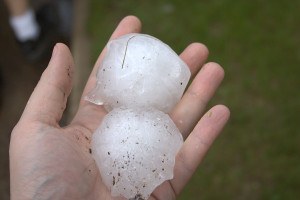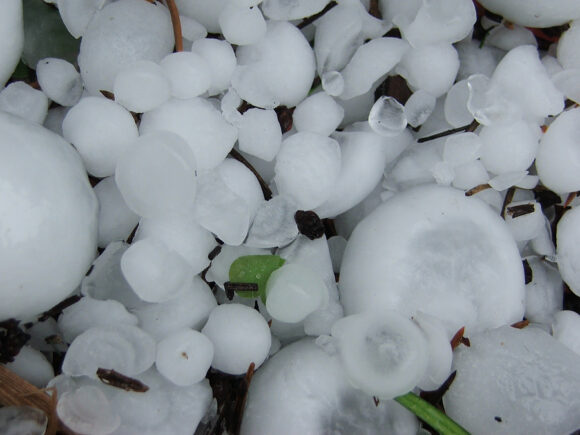Last year, Texas sustained the most expensive hail and storm season on record with an estimated 500,000 hail claims filed and insured losses totaling more than $4 billion, according to the Insurance Council of Texas.
The huge storm losses make the state, and certain counties, especially attractive to unscrupulous contractors and attorneys that engage in hailstorm lawsuit abuse. Industry experts said that the lawsuit abuse will lead to increased insurance premiums and insurers exiting the market. That’s why ending the abuse was listed among the state’s 10 legislative priorities for 2017, according to the Lieutenant Governor of Texas, Dan Patrick.
Two bills, SB 10 and HB 1774 focus on hail lawsuit reform.
After the bills were initially filed in February, Texans for Lawsuit Reform (TLR) President Richard J. Trabulsi Jr. said that “Hail-related litigation is the worst lawsuit abuse in Texas today. If left unchecked, it will hurt every Texas homeowner through increased property insurance premiums and deductibles, or reduced or lost coverage.”
A representative of a Washington D.C.-based think tank agreed that homeowners will suffer if the litigation abuse continues.
According to The R Street Institute’s Southwest Region Director Josiah Neeley, the legislation will preserve the right of a homeowner to sue while removing incentives for attorney led abuse of the legal process. He explained that those incentives were part of old provisions in state law meant to ensure prompt payment of claims, but instead caused the opposite effect.
“Trial attorneys are exploiting provisions in the law to run up large fee awards,” Neeley said. “Insurance companies often don’t even know there is an issue until a lawsuit is filed. Cases that should be resolved without litigation end up in a long and costly legal process.”
Mark Hanna, public relations manager for the Insurance Council of Texas, said its members are hopeful that the legislation will pass.
“Our members are optimistic that Texas lawmakers will pass a bill that simply requires that insurers be given notice and an opportunity to resolve any disputes or disagreements about storm-related property damage without resorting to prolonged and unnecessary litigation, that curbs excessive attorney fee recovery, and still protects consumers’ access to the courts if needed,” Hanna said. “Texas has already seen a 1400 percent increase in lawsuits, since 2012, that cannot be explained by any similar increase in claim denials or claims handling, and without this reform, we could continue to see more lawsuits, longer delays in claims being resolved, increased pressure on rates in some areas, and fewer choices for consumers as companies either limit or stop writing in some areas.”
The hail litigation crisis occurring in the state is having a significant impact on Texas-based insurers who cannot allocate the risk among a broader policyholder base, according to Steven Badger, a partner with Zelle LLP’s Dallas office.
Cory Moulton, the CEO of Houston-based Southern Vanguard Insurance Company, explained the impact of hail lawsuits on the low value home market it serves.
“Our company writes policies in the underserved Texas market of low-value homes. We issue policies without credit scoring or other common underwriting restrictions. Our homeowner customers need our inexpensive product to avoid being placed by their mortgage companies in very expensive forced-risk policies,” Moulton said. “Unfortunately, our low-value home market is one of the primary targets for the solicitation of homeowners for lawsuits, even when we have fully paid claims. We get sued regardless of whether we accept a claim or how much we pay on a claim.”
According to both Badger and Hanna, the bill has passed the Texas Senate and is scheduled for a full House vote on May 4. Badger said this is a major step forward, given a similar bill died in the Calendars Committee during the last legislative session.
If the legislation is enacted, Badger cited two reasons why he expects to see a reduction in the number of hail damage lawsuits being filed.
“First, lawyers will be forced to evaluate their matters before filing suit. The current ‘sue now investigate never’ model will change as lawyers will be required to submit a pre-lawsuit demand letter supported by a legitimate estimate of unpaid damages. Hopefully, this will force the lawyers to weed out the meritless cases, as opposed to the current practice of suing on everything just to extract a ‘cost of defense’ settlement from the insurance company,” Badger explained. “Second, with mandatory pre-suit notice supported by legitimate estimates, we expect to see more of the real disputes resolved without the need for a lawsuit. That’s good for everyone, especially the property owners who will now see quicker resolution of their disputes.”
Badger emphasized property owners will continue to preserve their right to sue an insurer if there is a dispute in the evaluation of damages.
“Also, very important is the fact that even with passage of this legislation, the property owner who was truly underpaid by its insurance company maintains every cause of action available to it today, with the ability to recover actual damages, statutory interest, prejudgment interest, treble damages, and attorneys’ fees,” said Badger. “None of that is taken away.”
If the legislation fails to pass, Badger said hail lawsuit abuse will continue.
“Without the legislation, the feeding frenzy to sign up property owners for lawsuits will continue unchecked,” Badger said. “Lawyers and their case solicitors will scour neighborhoods wherever a hail event occurs, signing up every homeowner willing to put their name on the retention agreement – regardless of whether their claim was already paid or if their home was even in the path of the storm. The lawyer’s promise of ‘free money’ is too alluring to turn away.”
Policyholders can expect tighter restrictions on coverage and increased policy premiums, he said.
“This will force the insurance industry to react. We are already seeing it happen, with endorsements restricting hail coverage and carriers pulling out of markets where the litigation abuses are most severe,” Badger said. “The insurance industry, especially the Texas-based insurers that only write in this state, cannot continue to absorb the enormous cost of defending thousands of lawsuits.”
Without reform, Badger predicts there may no longer be an option of hail insurance through private insurers. Instead, as he predicted in an earlier article he wrote for Claims Journal on the subject, there could be the development of an association that is an insurer of last resort.
“I fully expect that we will eventually see entire Texas market segments, perhaps the entire State of Texas, completely unable to obtain hail insurance coverage. This is how the Texas Windstorm Association came to be in 1971. After Hurricane Celia struck the Texas coast, the private insurance market stopped writing in that market. Don’t be surprised if we soon have a need for “THIA”, the Texas Hailstorm Insurance Association, when the private market entirely stops writing hail coverage,” added Badger.
Perhaps, most damaging of all is that the lawsuit abuse has altered the way people view insurance, he said.
“The Texas hail lawsuit feeding-frenzy has also brought about a change in how people see the insurance claims process. Insurance policies are there to help people pay for damage to their property, not to put money in their pockets for vacations and new cars,” Badger explained. “We now routinely see advertisements from contractors and others advising property owners how they can “profit” from their insurance claims. What these advertisements do not say is that if building owners are profiting from their claims they are very likely committing insurance fraud. We need to change this emerging culture of viewing an insurance claim as a lottery ticket.”
Badger first brought attention to hail litigation abuse in a 2014 Claims Journal article, The Emerging Hail Risk: What the Hail is Going On? Was he correct in his prediction of the affordability and availability of hail coverage if hail lawsuits continue unabated? It appears the industry will have its answer this month as the legislative session ends on May 29.
Was this article valuable?
Here are more articles you may enjoy.


 Cape Cod Faces Highest Snow Risk as New Coastal Storm Forms
Cape Cod Faces Highest Snow Risk as New Coastal Storm Forms  Elon Musk Alone Can’t Explain Tesla’s Owner Exodus
Elon Musk Alone Can’t Explain Tesla’s Owner Exodus  Uber Jury Awards $8.5 Million Damages in Sexual Assault Case
Uber Jury Awards $8.5 Million Damages in Sexual Assault Case  Tesla Sued Over Crash That Trapped, Killed Massachusetts Driver
Tesla Sued Over Crash That Trapped, Killed Massachusetts Driver 